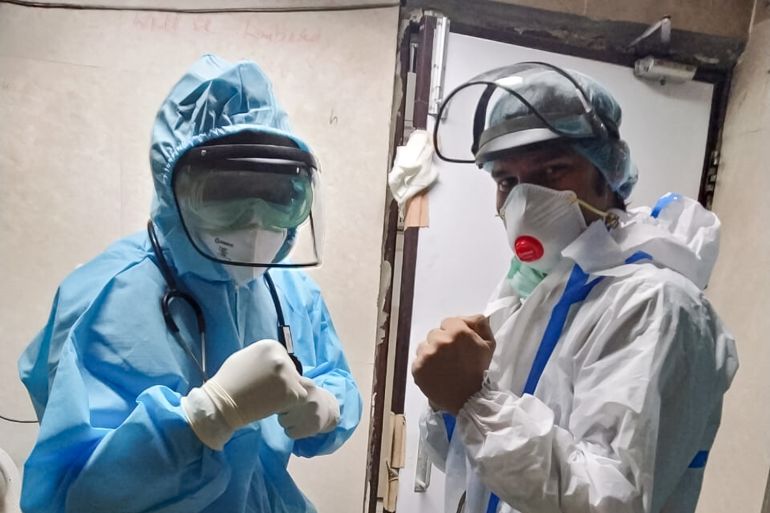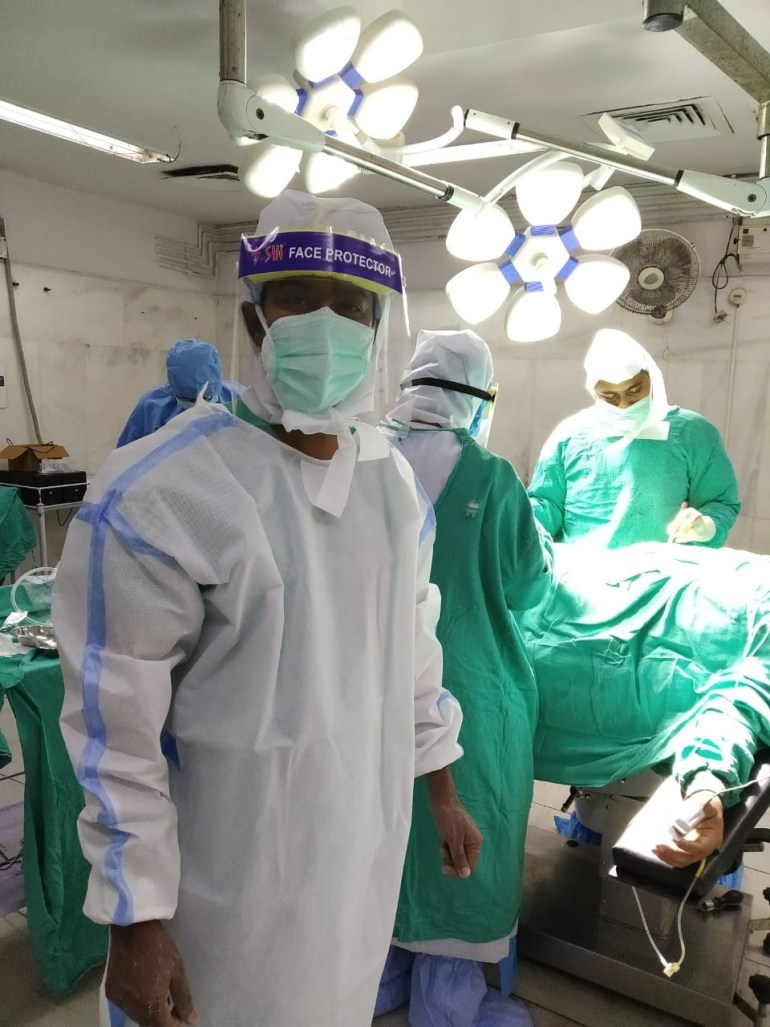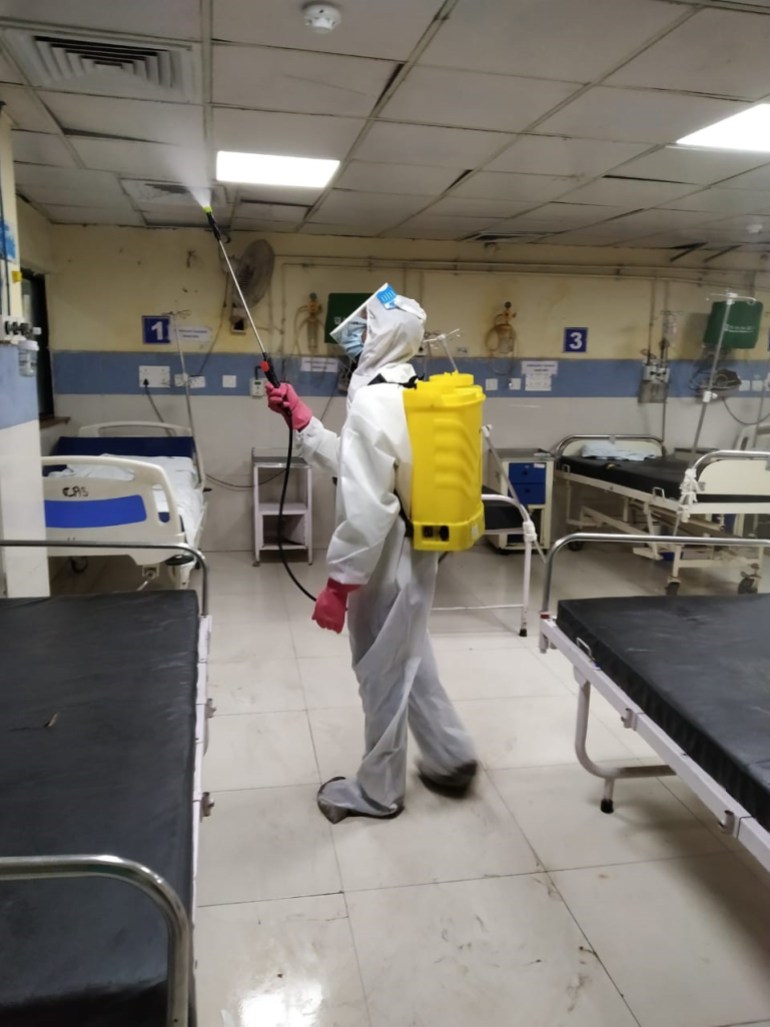An Indian doctor during COVID: ‘I fear the worst is yet to come’
An Indian doctor describes a typical day during COVID, including turning away patients because there aren’t enough beds.

Aftabuddin Ahmed is a 37-year-old surgeon at a government hospital in Delhi. During the first wave of the pandemic, he says his hospital would treat more than 5,000 patients – COVID and non-COVID – per day. Since the second wave began at the beginning of April, the hospital has been converted to a COVID-only facility. Hundreds of new patients arrive daily. He speaks to Minreet Kaur, describing a neglected healthcare system exposed by an unprecedented crisis.
It is late at night and my eyes are tired. Every day starts for me at 6am. Today, it was with a call from someone desperately searching for a bed for their loved one. I had to turn them away as we simply don’t have any beds available. I feel helpless knowing all I can do is refer them to another hospital where they also may not have any beds.
Keep reading
list of 4 itemsIndia COVID crisis: ‘Our mother has two swords over her head’
India COVID crisis: ‘Lack of oxygen killed him, not the virus’
India COVID patients ‘die due to oxygen shortage’
This shortage of beds and oxygen is unlike anything I have seen before. Every day, I receive about 20 calls – the desperation in people’s voices makes me feel terrible. “My father is in desperate need of oxygen, please help him or he will die,” some plead with me. Others cry as they tell me that they have young children and are afraid to die and leave them alone. Some shout; they believe it’s our fault. But the truth is this situation is out of control.
I try to advise people to the best of my ability – directing them to trusted social media accounts that tell people where they can find oxygen or to gurdwaras and other places providing it.
Towards the end of my shift today, I looked around at the hospital and found it hard to digest what I saw. We have 400 beds and each of them is occupied by a patient with COVID. I felt physically exhausted but I heard the sound of sirens getting closer. A couple of paramedics carried a 60-year-old man who had collapsed into our A&E department. “COVID hai,” shouted one of the two and a junior resident rushed to check his vitals. His oxygen saturation was 30 percent [it should normally be above 94 percent], but we got him oxygen and performed CPR to resuscitate him. In this case we were successful, but in many others, we aren’t.

It takes a toll on your mental health and I feel tired and drained. A surgeon dreams of conducting beautiful, successful surgeries – removing gall bladders or appendixes – or even of late-night emergency laparotomies. This is the sort of thing I would normally be doing. This is the job I know inside out. Never in my wildest imagination did I think I would be dealing with a virus so small that I can’t dissect it with a scalpel. But what we’re experiencing now is unprecedented, it’s strange and it’s hard to digest.
Today, I received an emergency call for a patient with surgical emphysema (air or gas in the subcutaneous tissues, which can happen when a patient has been on a ventilator) as I was in the middle of setting up a type of ventilator referred to as a BIPAP machine for a 28-year-old patient whose oxygen levels had fallen way below 90 percent in our makeshift ICU. I didn’t know whether either of them would survive, but they did – and that makes today one of the better ones I’ve had.
But in the past week, I have seen young and old, men and women, those with and without comorbidities gasping for breath.
It is unbearable to watch. That sound – the sound of people trying so desperately to breathe – I would hear it in my sleep, if ever I was able to get some. I am on call all day, every day. We work around the clock. The situation is dire but I fear the worst is yet to come.
I live alone in Delhi. My mother, father and older brother are in Kolkata, about 1,500km (930 miles) away. My mother is diabetic and hypertensive and my father has a variant of the neuromuscular disease ALS. I live in constant fear of them getting infected, which is why I decided not to visit them for the past six months.
Delhi is in a state of lockdown so sometimes even getting breakfast before work is a challenge. Just getting into our PPE in the heat of Delhi can take a lot out of a healthcare worker. I always tell my juniors to keep hydrated, but it’s not easy. And I have this feeling – this constant tightness in my chest – as I see more and more dead bodies around me. All of the deceased are somebody’s child, mother, father, sister, brother, grandparent. COVID has not spared any generation here.
The struggle is real. We are waiting for the next oxygen delivery truck to arrive soon. Fortunately, our hospital installed a liquid oxygen plant last year, so we have not run out. But the demand is so high it needs to be refilled daily.

The conditions in the emergency room cannot be expressed in words. It is the same in the wards, the main ICU and the makeshift one. There are patients everywhere, even the hallways are full. There is no room to move.
Not a day goes by without us losing a patient. As doctors, we do everything we can to save our patients. When we lose one, we take a pause and then move straight on to the next and try and try all over again. I cannot help but ask myself if this could have been avoided if the government had taken COVID more seriously and put a proper lockdown in place.
As president of the Resident Doctors Association, my work is not limited to treating patients. I also have to look after the needs and address the problems faced by the resident doctors in our hospital. As much as COVID is a threat to the general population, it is also a danger to us. Healthcare workers have been working tirelessly and selflessly during this pandemic without any additional incentives, and we are continually exposed. Recent COVID testing at our hospital showed around a 50 percent positivity rate among our healthcare workers. The testing is done every day and, of course, those who test positive must quarantine – which puts a further strain on those still working.
But this isn’t the only danger we face. There have been many incidents where healthcare workers have been verbally and physically abused by relatives of patients who have died. People forget that we are humans too and it’s not in our control. We are doing our best to help. The extreme toll this takes on our mental health every day is hard to describe.
We are ready to provide care to all. But that can’t be at the expense of sacrificing the lives of the doctors, nurses and caregivers. If we do, the system will collapse sooner rather than later. I am drained, tired and fear this will affect me for the rest of my life.
In the past 24 hours, India has reported a further 400,000 COVID infections and 3,980 deaths.
The healthcare system has been ignored over the last 70-odd years of this country’s existence. I have witnessed the underfunding first hand. We are far short of the number of hospitals, doctors, nurses and other staff that we need. We don’t have enough equipment, beds or resources. And this is in the country’s capital. Imagine what it must be like for rural doctors.
We have failed to realise that “health is wealth” and this is because health has never been an election winner.
Government hospitals have always been overstretched as there is no charge and everyone, from poor to rich, are looking for beds here but we don’t have them. Turning people away is heartbreaking. I know it could mean they will die.

As I wait for the next metro train to take me home I worry about what will come next. COVID is spreading fast and far, and the number of patients is only increasing.
If there is something I could tell the general public, it is please don’t panic and come to hospital unnecessarily when you can manage your symptoms at home. This not only stops healthcare workers from being able to focus on those who truly need us, but it is also physically and mentally draining for the patients themselves. The best way to help us is by breaking the chain of transmission. Stay home, wear a mask, socially distance, follow medical advice and don’t listen to those who criticise vaccines without facts or try to convince you that COVID isn’t real. And to the government, I would say that our sincere request is to please prioritise health above all else.
But I also want to remind people that amid the devastation there are stories of survival, like the 65-year-old patient who was struggling to breathe and whose oxygen saturation levels had fallen to 67 percent when we admitted her to ICU. We started her on high-flow oxygen, steroids and nebulisation. Slowly, she started showing signs of improvement and after five days of hospital care she was discharged with a smile.
It is devastating to see the number of people who are dying and I feel for those who have lost loved ones, but there are also many who are recovering. And, as doctors, we are doing our very best to save as many lives as we can.